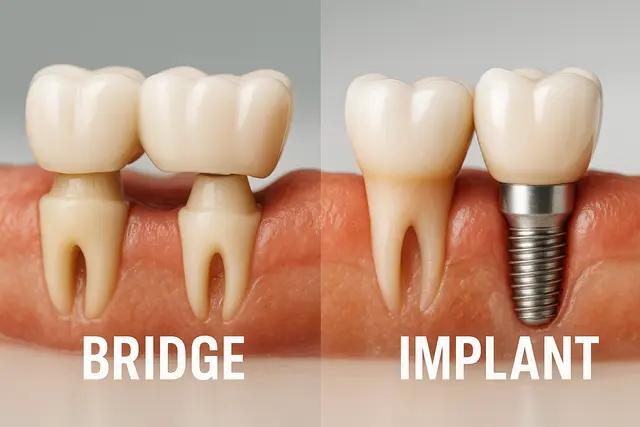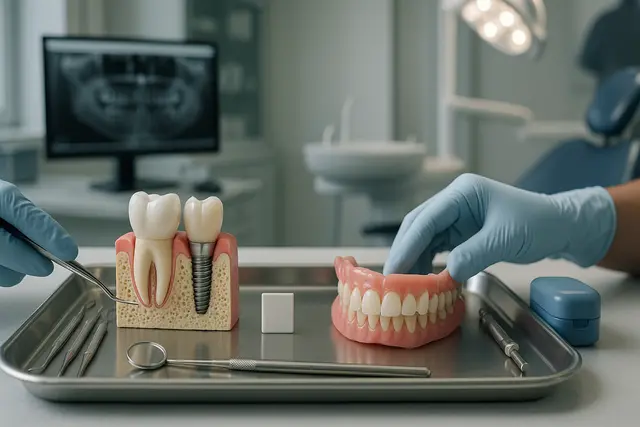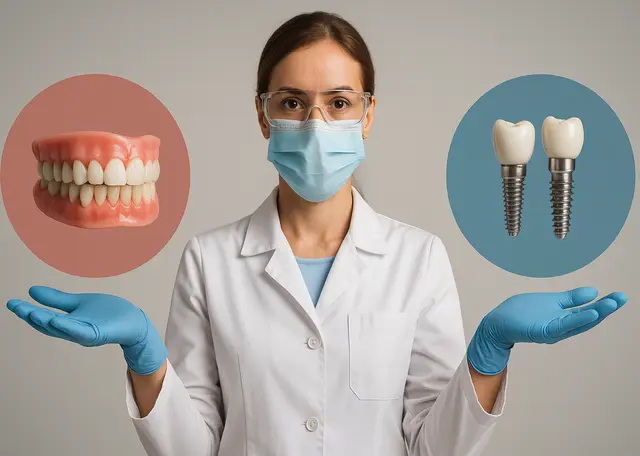Prosthodontics
6 min read
Oct 17, 2025
Tooth-Supported Bridge vs. Implant Comparison: Benefits, Drawbacks, and Insights
Deciding between a dental bridge and a dental implant can feel overwhelming, especially when both options promise to restore your smile and improve oral function. Each solution comes with its own set of benefits, considerations, and ideal use cases, making it essential to understand how they compare before choosing what’s right for you.

What Is a Dental Bridge
A dental bridge is exactly what it sounds like, a literal bridge that fills in the gap left by one or more missing teeth. It’s held in place by dental crowns cemented onto the adjacent teeth for support.
There are a few types of dental bridges, including the classic traditional bridge, the cantilever bridge, and the Maryland bridge. Each has its place depending on how many teeth you're missing and where.
Here’s the kicker: a dental bridge relies on the health and stability of the neighboring teeth to work. That means your natural teeth have to be strong enough to support a bridge and take on extra pressure they weren’t really designed for.
What Is a Dental Implant
Now, let’s talk about the techy superstar of tooth replacement options: the dental implant.
A dental implant uses a titanium post (yes, actual metal) that’s surgically placed into your jawbone to act like a tooth root. On top of that, we attach an abutment and crown, and voilà, an artificial tooth that looks and functions just like the real deal.
Unlike bridges, implants don’t need neighboring teeth for support. They stand alone. They’re independent. They pay their own bills.
Sounds cool, right? It is. But implants require healthy gums and adequate bone to anchor the post. So not everyone is a candidate right off the bat.
Comparing a Dental Bridge vs Implant
Okay, time for the face-off: dental bridge vs implant. What really sets them apart?
The biggest difference between a dental bridge and a dental implant lies in how they’re secured and how they impact your surrounding teeth. A bridge needs adjacent teeth for support. An implant does not.
Think of a bridge like a team sport. Everyone has to pitch in. An implant is more like a solo athlete, strong, steady, and self-sufficient.
Dental Bridges vs. Implants for Different Situations
Now, let’s talk about real-world use. When might someone choose dental bridges vs implants?
If you're missing a single tooth and your neighboring teeth already have large fillings or crowns, a dental bridge may be a simpler fix. It can restore your smile quickly without surgery. Plus, dental bridges are generally more affordable upfront.
But if your teeth are healthy and you’re looking for a long-term, low-maintenance option, a dental implant is the gold standard. Implants can last decades, sometimes a lifetime, with good care.
Pros and Cons of Dental Bridges
Let’s not sugarcoat it (we’re dentists, not donut shops). There are definite pros and cons of dental bridges.
Pros
Faster process (usually done in 2–3 visits)
More affordable upfront cost
Ideal if your adjacent teeth need crowns anyway
Cons of Dental Bridges
Requires grinding down healthy teeth for crowns
Bridges may not last as long as implants
Risk of tooth decay beneath a bridge
Doesn’t protect against bone loss in the jaw
Dental bridges typically last 5 to 15 years, depending on how well you care for them and whether your surrounding teeth stay healthy.
Pros and Cons of Dental Implants
Alright, now let’s flip the script and look at the pros and cons of dental implants.
Pros
Implants can last 25+ years
Don’t rely on adjacent teeth for support
Look and feel like natural teeth
Cons of Dental Implants
Implants cost more upfront
Surgical process takes longer
Not ideal if bone or gum health is poor
Not recommended for smokers or folks with certain conditions
The process of getting a dental implant can take several months, especially if bone grafting is needed.
Bridges or Implants When You Want Fast Results
Need to get your smile back before a wedding or that all-important job interview? Bridges or implants can both do the trick, but only one is truly quick.
A traditional dental bridge can often be placed in a matter of weeks. If speed matters and your teeth are healthy enough to support a bridge, it’s a great short-term (and often long-term) option.
Implants require healing time, especially if bone grafting is involved. So if you're in a rush, implants may not be ideal, at least for now.
The Cost of Dental Restoration Options
Let’s talk money, because hey, your wallet counts too.
The cost of dental implants is higher upfront than bridges. There’s no getting around it. On average, a single dental implant can run $3,000 to $6,000, depending on where you live and what's involved.
The cost of a dental bridge, on the other hand, is typically $2,000 to $5,000. So if you’re comparing much is a bridge vs implant, bridges are generally more budget-friendly, at least at the start.
That said, implants may save you money in the long run. They don’t need to be replaced as often, and they help prevent future problems like shifting teeth or bone loss.
Traditional Dental Bridge vs. Implant Durability
Here’s where things get interesting. A traditional dental bridge usually lasts about 10 years, sometimes longer with good care. But even the best bridges may eventually fail due to decay, gum disease, or wear and tear.
Implants? They’re in it for the long haul. Implants can last a lifetime. As long as your gums stay healthy and you keep up with regular dental check-ups, implants can last a lifetime.
Exploring Tooth Replacement Options and Lifestyle Fit
Lifestyle matters, too. If you don’t want to fuss with flossing under a bridge or you’re active and want the strongest bite possible, implants might be a better match.
But if you have health issues, bone loss, or are simply not a fan of surgery, a bridge or an implant alternative like a partial denture might be a safer, easier call.
Decide between a bridge or implant based on what fits your health, timeline, budget, and comfort with the process.
Dental Bridge and an Implant Combo
Here’s a twist: sometimes it’s not either-or. In cases where multiple teeth are missing, your dentist might recommend combining dental bridge and implant.
For example, you can place implants at either end of a gap and use them to hold a bridge in place. That means no shaving down healthy teeth, and no need for one implant per tooth.
This combo approach gives you the strength of implants with the coverage of a bridge. Win-win.
Dental Bridge Costs and Other Considerations
Before you choose, get a personalized estimate. The cost of dental work can vary widely depending on:
Your dentist’s location and experience
Materials used (some crowns are more durable than others)
Whether insurance covers part of it
How complex your situation is
Also ask about the types of dental bridges available and which one makes sense for your case. A Maryland bridge, for instance, uses metal wings bonded to the back of your teeth, ideal for front teeth but not great for chewing-heavy molars.
Dental Implants and Bridges Aftercare
Regardless of your choice, care matters. Regular dental check-ups, daily brushing and flossing, and avoiding hard candies (yes, we see you) will help your dental restoration last as long as possible.
For implants, keeping the area around the implant clean is crucial. Gum disease around the implant can lead to failure.
For bridges, watch out for signs of tooth decay or pain in the adjacent teeth used for support. These can shorten your bridge’s lifespan.
What Is the Main Difference Between a Dental Bridge and a Dental Implant?
The main difference lies in how they are supported. A dental bridge relies on adjacent teeth for support, these teeth are filed down and used to anchor the bridge. A dental implant, on the other hand, is surgically placed into the jawbone and does not affect neighboring teeth. Implants act as standalone replacements that mimic natural tooth roots, offering long-term strength and stability.
When Should You Choose a Dental Bridge Instead of an Implant?
A dental bridge may be the better option if you need a quicker, more affordable solution or if your neighboring teeth already need crowns. It's also suitable when surgery isn’t recommended due to medical conditions or limited jawbone density. Bridges are generally completed in a few dental visits and don’t require the healing period that implants do.
What Are the Long-Term Benefits of Choosing Dental Implants?
Dental implants offer superior durability, often lasting 25 years or more with proper care. They help preserve jawbone health by stimulating bone tissue, unlike bridges which do not prevent bone loss. Implants also maintain the integrity of nearby teeth since they don’t require support from them. For patients seeking a permanent, natural-feeling solution, implants are often the preferred choice.
How Do Costs Compare Between Dental Bridges and Implants?
Dental bridges typically cost less upfront, between $2,000 to $5,000, while a single dental implant can range from $3,000 to $6,000 or more. However, implants may be more cost-effective over time because they don’t usually need replacement as often as bridges, and they help prevent further dental issues like bone loss or shifting teeth. The right choice depends on your budget, timeline, and long-term oral health goals.
Read Next
Related Posts

Prosthodontics
Implant vs. Dentures Pros and Cons: A Deep Dive into Modern Solutions
Missing teeth can impact more than just your smile, they can affect how you eat, speak, and feel about yourself. Fortunately, modern dentistry offers two leading solutions to bring back both function and confidence: dentures and dental implants. Understanding the pros and cons of each can help you make the choice that fits your needs, lifestyle, and budget.
7 min read
Oct 17, 2025

Prosthodontics
Full Mouth Implants vs. Dentures: Which Is Better for You?
When it comes to replacing missing teeth, the choice between full mouth dental implants and dentures can be overwhelming. Each option has its own set of benefits, limitations, and long-term considerations, making it essential to understand what works best for your needs, health, and lifestyle.
5 min read
Oct 17, 2025

Prosthodontics
Dental Implants vs. False Teeth Comparison: A Side-by-Side Look at Options
Losing teeth can be a life-changing experience, affecting everything from your smile to how you eat and speak. Fortunately, modern dentistry offers reliable solutions to restore both function and confidence. This article explores the key differences between dental implants and false teeth, helping you understand which option might suit your needs best.
6 min read
Oct 16, 2025
Don’t have time to research every dentist around you?
See why 30k+ patients trusted us